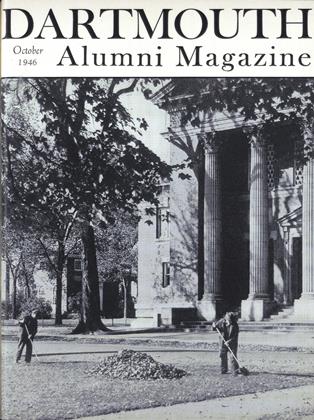Of all the predicted postwar booms, the only one which has thus far attained or surpassed the status set for it is the current frenzy for things bigger and better in the world of sports. From polo to ping-pong, attendance figures and box-office receipts make the Gold Rush of '48 look like a quiet stroll through the park by comparison.
Taking the pre-season publicity blurbs with the usual grain of salt, one still gets the firm conviction that college football this fall will be no exception. One of the greatest talent hunts in collegiate history for raw, young manhood by the pound has been going on since V-J Day. Not that large young men should not be given the same opportunity for higher education as small young men, but the financial advantage of possessing a few more muscles than the next man is becoming so pronounced that parents of young boys might well consider sending their offspring to Charles Atlas for preparatory schooling.
It is true enough that in many sectors of the country prewar college football was Big Business; today it is approaching the Robber Baron stage, with institutions publicly wrangling over the possession of talented stars and wooing them with that scarcest of all commodities, apartments.
Without arguing the merits per se of the University of Chicago-Hutchins approach, it does seem that the past year's Ivy League agreements were a timely step in the right direction. Following World War I, college football became rough and tough and professional. On the eve of this first big postwar season there is already evidence that history is likely to do far more than repeat itself.
Although some very nice things were said earlier in the year at a general meeting of the various college leagues in Chicago, no one was trampled to death in the rush to take any definite action on the expressed high-minded sentiments. Perhaps the old saw about the thought being father to the deed might hold true within a year or so. It certainly would be to higher education's credit if all colleges adopted something like the: Ivy League agreement, and at least kept football within the confines of the various stadia and made it a fall rather than a year-round sport.
As a game and as a valuable part of college life and education, football needs no apologists. The current postwar spectacle, however, is giving an unfortunate opening to the academicians and journalists eager to point out the "evils" of the sport. The remedy lies, of course, with the colleges themselves; and unless common sense once more prevails, professional football will still further take over a national game that has derived its finest qualities from the colleges which fathered and developed it.
 View Full Issue
View Full Issue
More From This Issue
-
 Sports
SportsWith Big Green Teams
October 1946 By Francis E. Merrill '26 -
 Class Notes
Class Notes1917
October 1946 By MOTT D. BROWN, DONALD BROOKS, SUMNER B. EMERSON -
 Article
ArticleOPERATION CROSSROADS
October 1946 By WILLIAM J. MITCHEL JR. '42 -
 Article
ArticleThe Coming "Boom and Bust"
October 1946 By BRUCE W. KNIGHT -
 Article
ArticleCan We Achieve Economic Stability?
October 1946 By JAMES F. CUSICK, -
 Class Notes
Class Notes1918
October 1946 By ERNEST 11. EARLEY, DONALD L. BARR
Article
-
 Article
ArticleLANG TO COACH BASKETBALL TEAM
December, 1909 -
 Article
ArticleDudley Orr '29 Honored
February 1974 -
 Article
ArticleDartmouth Evolving
Jul/Aug 2004 By Dean of the Faculty Michael s. Gazzaniga '61 -
 Article
ArticleStatement of Ownership
November 1983 By DOUGLAS McCREARY GREENWOOD -
 Article
ArticleFace to Watch
Jan/Feb 2003 By Julie Sloane '99 -
 Article
ArticleWith the Outing Club
April 1937 By William B. Rotch ’37


